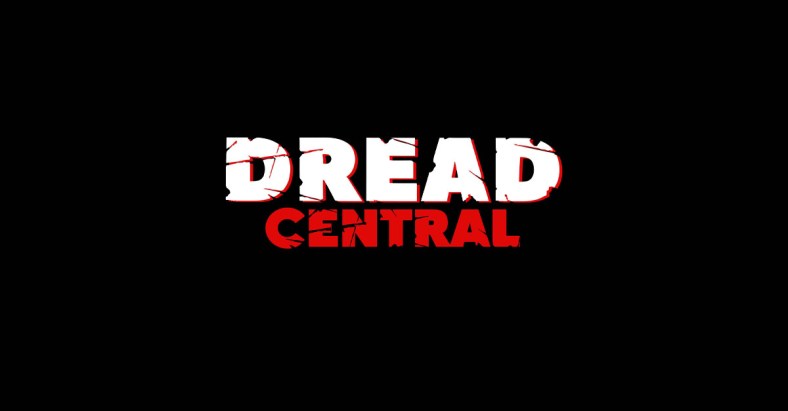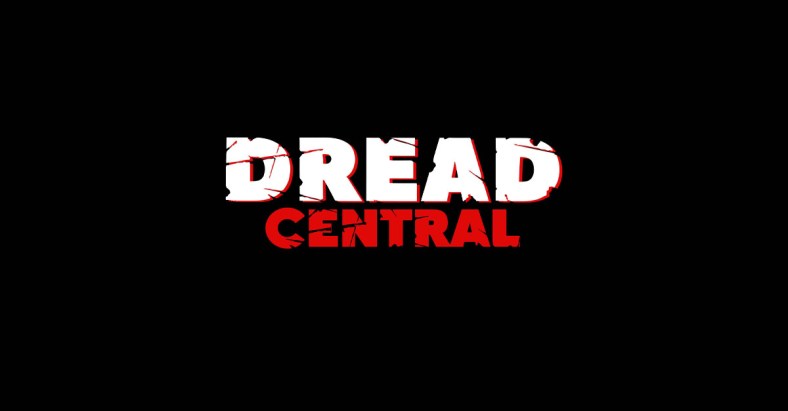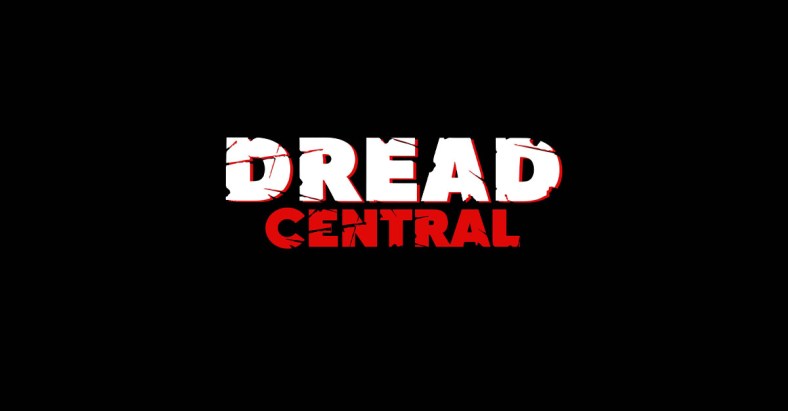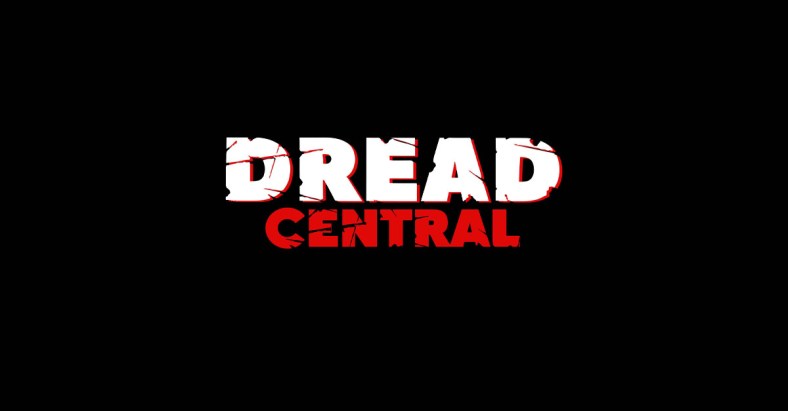Exclusive Kuso Clip + Interview With Steve, aka Flying Lotus

Today marks the release of Kuso, the debut film of Steve, the filmmaking alter-ego of Steve Ellison, better known as music producer, DJ, and rapper Flying Lotus, which premieres on AMC’s horror streaming service Shudder. The film has gained quite the notorious reputation for being one of the most disgusting films every created. While I personally don’t think it goes THAT far, I will fully admit that there are moments in the movie that will absolutely make some people feel a bit queasy, at the very least.
To give you an idea of what the movie has in store for viewers, we’ve got an exclusive clip that shows a young boy smear poop on the face of a humanoid that lives within a fleshy tree. No, I didn’t make that up and, yes, that’s what happens in the clip. Check it out for yourself, if you don’t believe me!
Additionally, we’ve got an interview with Steve below that might help those of you who watch the film understand a bit more about what’s going on.
Make sure to follow Steve on Facebook and Twitter.
Produced by Eddie Alcazar and featuring Hannibal Buress (Neighbors, “Broad City”), Anders Holm (“Workaholics,” “The Mindy Project”), Tim Heidecker (“Tim and Eric Awesome Show,” “Eastbound and Down”), and iconic funk musician George Clinton, the film also includes an original score and musical collaborations with Aphex Twin and Akira Yamaoka (Silent Hill).
Dread Central: Hey Steve, how are you doing?
Steve Ellison: I’m good. Been waiting to talk to y’all. I’m a fan of you guys, so I’m curious what you think of the movie.
DC: Oh wow! Thank you so much! We really appreciate that! I’m glad you asked that because I got the chance to watch it Monday night and it was…an experience. I enjoyed it but it was definitely an experience!
SE: Better that then not an experience, right? [laughs]
DC: Absolutely! It was definitely memorable and had me thinking about it for a while. What was fun for me was that I followed a lot of David Firth’s stuff for a long time…
SE: Oh, you’re a fan of him? Great!
DC: Yeah! I’d been watching Salad Fingers years ago, so it was this weird feeling where everything felt like it came full circle and, this is probably a strange word to use with Kuso, but there was strange sense of comfort watching it and I don’t know what it says about me!
SE: It says we love the same things, y’know? It’s funny because I’ve never heard it described that way! [laughs]
DC: As I was watching it, there was this constant thought running through my head that narrowed down to, “How did this movie even come about? Who thought of it? How did they find this thread?” Tell me about that.
SE: Well, I have to say it was the perfect storm. It’s a cheesy thing to say but it’s true. I had just got finished working on a music video with David Firth and I had been working with another director named Eddie Alcazar, we did a project together called “Fuck You”, and it was a lot of fun! But it all happened so fast. It happened super fast, like TOO fast! [David] came over to my house, I’d never met him, I played him some music, he came back with a treatment, storyboards, all this stuff that he had to make, and he did it within a month’s time. I thought to myself, “Wow, someones determined.”
That’s how you have to be. If you have an idea, you can’t sit on it too long. It’ll just get left behind, you know? So, I had just been getting a bit burnt out only making music. I always wanted to get back into making films and filmmaking. So, I think I just decided to start channeling my fears. I was reading a lot of manga and, you know…yeah, it was just a perfect storm. It all happened.
DC: I love that you brought up that you were reading manga because when I was watching Kuso, clearly there was inspiration from Cronenberg and Lynch but I was also seeing elements of Tsukamoto’s Tetsuo: the Iron Man and I don’t know if that’s just on me…
SE: Absolutely! Absolutely! That’s one of my favorite movies of all time, so that would have to be in there somewhere.
DC: I’m glad I nailed that because it wasn’t only the visuals but also the atmosphere. When I look back at Tetsuo: the Iron Man, it’s obviously very striking and very scary but the atmosphere is so claustrophobic and that’s exactly what I was getting from Kuso.
SE: Yeah!

DC: It’s amazing that even in those moments where…there’s a shot I remember when that little bald child was in the woods and he was feeding that weird tree stump and the camera was in the distance and the light was coming through the trees, it was very beautiful but felt very contained. As though nothing could escape that frame.
SE: That story I wanted to be very, very precise. I didn’t want to have a lot of movement with the camera, I wanted it to be very precise. It’s not something I would normally do but for that story it had to be that way. I wanted everything to feel distant. The previous thing I’d done was the story with the couple in bed. I did all that stuff in my house, in my rooms, and I just wanted to do anything outside. [laughs] I just wanted to go outside at that point! That was my goal, to go outside and do something wide-feeling.
DC: So much thought was obviously put into how every segment had to have a very specific visual aesthetic and feel and I’m wondering if you can dive into how you made those decisions.
SE: Well, I think I decided the tone of each scenario early on in the writing. The writing dictated how it would all feel. I really, as you pointed out, I had a real love for setting the ambience and the atmosphere. I also loved to think about the continuing aesthetics.
In each sequence, I worked with a different director of photography and format. There’s also that! Some of it was shot on 35MM, some of it was shot on 16MM, some of it was shot on the ARRI Alexa, and so on. But it was really important for me to establish a different kind of storytelling for each bit because I did want it to feel like they are different stories happening in the same world and, depending on where you are and that perspective…the little kid, his life is so rigid and a repetitious kind of existence, so the shots repeat. Motifs repeat. The left to right movements. There’s a lot of things like that that I try to think of.
There’s the Sock story, which I wanted to feel confined, so we have the camera close on her often. But still, the movement, the darkness, the shadows…I love that so much because it can feel expansive or it can feel very dense. So I really enjoyed getting into that stuff!
DC: You mentioned all these different formats, each of which tell a different story, a different flavor…
SE: Absolutely
DC: …and something that’s being talked about a great deal in the world right now is diversity and the need to hear other perspectives. In Kuso, there was a wide range of characters in terms of ethnicity, race, and even language, but it felt completely natural and not like it was, “Oh, we have to hear from this particular ethnicity.”
SE: Right! [laughs]
DC: Each of these characters comes from Los Angeles and it just makes sense that they’d be there. Can you talk about..
SE: That’s exactly it, man. You got it! You got it! That’s exactly it! I live in LA where there are people who don’t speak English and that’s just their normal life. What happens if you live in LA and you’re trapped under a building [laughs] and you’re from Japan, it’s just life! That’s how it is!
I grew up in a very diverse part of LA as well, so I got to see so much but, at the same time, when it comes to films and a lot of the things we’ve seen lately, we never get to see certain people. We don’t get to see Asian actors. We don’t really get to see black characters that aren’t about race and about the struggles of the ghetto and shit. That’s all we got! I wanted to show people that they are more than what they seem for these minority characters. That’s part of what I feel like I’m here to do, to put different people on the screen, different characters. I’ve seen the world, man. It’s a small ass world! [laughs]

DC: A quick comment based off what you just said and an observation about Kuso is that I loved that these minority characters go to show sides of themselves that film often disregards. We got to see them with fear, with kinks and fetishes, and, even with the extravagance of Kuso, there was a sense of authenticity running underneath.
SE: Thanks man, I appreciate that. I hope people pick up on that and get beyond the gross stuff. I mean, we all know that. I just hope people see it, get over that part, and see the other bits to. I’m glad you can see it.
DC: Speaking of that grossness, this film has gained a sense of notoriety. So, a two-parter for you: First, do you think the film deserves that reputation and, second, what do you think people should be taking away from Kuso that they might not be because of that reputation?
SE: Well, it’s tough for me to say. It’s tough for me to come at it from that place because I feel like my view of it changes every time I see it. I only recently had discovered that it’s almost a musical! It’s almost a musical! I didn’t know that! I hate musicals! Why would I ever make one?! [laughs] But it kinda is? Kinda? Y’know, everybody is singing and doing stuff musically…there’s so much music in the movie, which I would love for a lot of people to know. I think a lot of my fans feel betrayed that I abandoned music altogether but there’s so much music in the movie and I hope that some of them will enjoy that and appreciate it.
As far as it being notorious and having a reputation, I’m not gonna front, that’s the place where I came from with this. I started out with some punk rock attitude about it. Then, as I progressed, I couldn’t help but make it more artful but it came from a place with being fed up of all these bullshit movies and fake-ass… You know! [laughs] I been seeing my favorite filmmakers turn straight pussy, just straight up pussy. I wanted to come out swinging my first time. I wasn’t come out and my shit just gets buried. I wanted to come out and make sure that I’m out here! [laughs] I’m not fucking around. I’m really out here and I really care. I really want it to do well. It’s not just some vanity project. I actually care about this. I’ve been trying to do this. But I’ve only now just gotten over my personal fears and pursued it. I guess that’s what I want people to know, I guess! [laughs]
DC: I’m glad you brought up the music because it was so important in assisting with the ambience and atmosphere. And getting Aphex Twin and Akira Yamaoka, who I’ve been listening to for almost 20 years now…
SE: See? I KNEW this movie was gonna be…I knew something about it that there is a safe place [laughs] for Silent Hill fans!
DC: That’s exactly it! I gotta tell you, there was a point where I was watching it and I heard some music and I slammed the ‘Space’ bar and hit ‘Pause’ and went over to iTunes and loaded up the Silent Hill 2 soundtrack…
SE: [starts laughing]
DC: …and there it was! Got it! And I knew it right away!
SE: [still laughing] Oh, that’s fucking funny, dude! Oh, this is perfect. This is perfect. See, I made it for you, man!
DC: You know what? I will happily accept that honor!
SE: [laughing] That’s great, man! See, that’s what I mean. I love Silent Hill. The shit had a huge effect on me.

DC: I know that you said you went from music to filmmaking now and that you wanted to come out swinging, and, let’s be completely honest, swing you did, my good sir!
SE: [laughs]
DC: Because you’re a musician, obviously how music is placed within a film is of vital importance. Can you talk about it from that perspective?
SE: I knew that if I was going to do my first movie, I had to be involved in the soundtrack. There was a lot of me trying to fight it for a while because I really wanted to focus on the filmmaking part of that. But, after a while, I realized I could serve my music. So, I just had a lot of fun. I got to produce a lot of music for it that I wouldn’t have ever made if it wasn’t for what the scene required. That was a lot of fun, working with musicians and getting them to make shit that is out of their comfort zone. Like, I wanted something to sound like a European bistro [laughs] but a mischievous one. So, it was super fun and everyone is looking at each other like, “Are we actually playing this stuff right now?!” Yeah, you are! This is great!
But that was the most fun but it was a lot. It was a big undertaking. In a time when people only want me to make music, I didn’t anticipate how difficult it would be to do all the post-production in this movie. I figured, “Oh, so much of it is practical, so the post isn’t gonna be that difficult.” But it proved to be a big challenge. I’m so glad it’s over!
DC: That brings me to my last question. You came out swinging but, after that, people can get exhausted, so what energy are you pulling from for whatever is next on your plate? And what IS next on your plate?
SE: Oh man, I think I’m pulling from that same place that a lot of first time filmmakers have where they try to put every bit of their knowledge of art and life and love and everything, they try to put it into their work. But this movie is 30 some odd years in the making. That’s what they say, right? It’s probably gonna feel like that.
Who knows? My next one probably won’t be like Kuso. It’ll probably be a little more tame. Then there’s gonna be that kid who’s like, “Oh, it ain’t like Kuso. It doesn’t have as much energy as Kuso did! I liked you when you were doing cool shit and now you’re a grown ass man making romantic comedies!”
I gotta say man, I’ve been seeing some trailers out there that have been ruining my fucking day. I don’t wanna call out names because I’m new in this bitch [laughs] but, yo man, we gotta start pushing this thing further. It’s a huge medium. I just want everyone to progress.
DC: I think we’re always going to need that shot in the arm to keep things going.
SE: Yeah man, that’s right.
DC: Thank you, Steve. It was a pleasure talking and I hope we get to do it again someday!
SE: Thank you, man. We will, for sure!
Synopsis:
Broadcasting through a makeshift network of discarded televisions, KUSO depicts the aftermath of Los Angeles’s worst earthquake nightmare. Viewers travel between screens and aftershocks into the twisted lives of the survived, experiencing a hallucination that is half-Cronenberg, half-“Ren & Stimpy.”

Categorized:News

